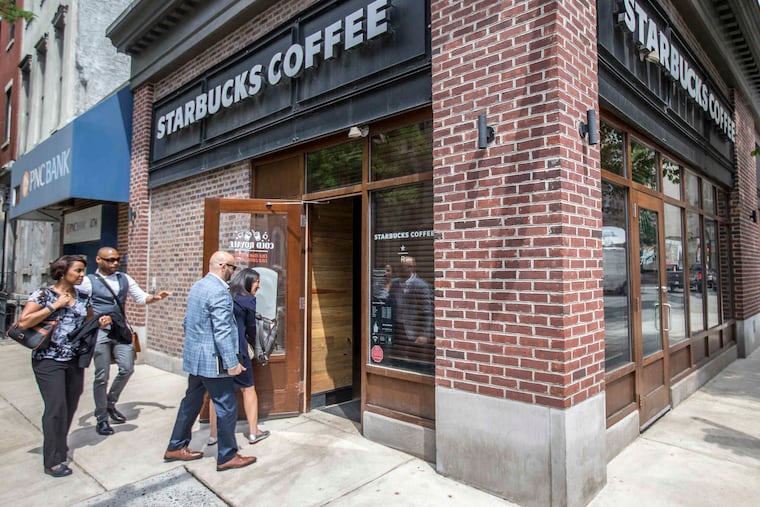Starbucks will let employees close bathrooms, modifying policy prompted by 2018 Philadelphia arrests
The policy modification came as part of an announcement that Starbucks would be closing 16 stores across the country, including one in Center City.

Starbucks is modifying its open-bathroom policy that allowed anyone to use the restroom at its stores. Employees now have the option to close bathrooms if there are safety concerns.
The open-bathroom policy was prompted by the controversial arrest of two Black men in a Philadelphia Starbucks in 2018. The Seattle-based coffee chain announced Monday that store employees would be able to close bathrooms if it wasn’t possible to maintain safety.
The policy tweak came as part of an announcement that Starbucks would be closing 16 stores across the country, including one in Center City.
» READ MORE: A Center City Starbucks is closing due to safety concerns
“[W]e don’t want to become a public bathroom, but we’re going to make the right decision 100% of the time and give people the key, because we don’t want anyone at Starbucks to feel as if we are not giving access to you to the bathroom because you are less than,” Starbucks CEO Howard Schultz said during a 2018 Q&A session. “We want you to be more than.”
A Starbucks spokesperson said that the bathroom policy had not changed — bathrooms would generally remain open to all — and that employees would simply be able to close bathrooms to the public on a case-by-case basis.
In a statement posted to the Starbucks website, the company’s senior vice presidents of U.S. operations wrote that giving employees the option to close restrooms was one of several initiatives geared toward making Starbucks shops safer for workers and customers.
In 2018, Rashon Nelson and Donte Robinson were waiting for a business associate at the Starbucks at 18th and Spruce Streets. During a television appearance at the time, Nelson said he had asked to use the bathroom but was denied access because he wasn’t a customer.
A manager called police, telling authorities that the two men refused to leave after she told them they couldn’t stay in the store without buying anything. The two were then arrested.
» READ MORE: From 2018: Philadelphia Starbucks case: What we've learned since the arrests
Minutes after the call, a radio dispatcher said a “group of males” was “refusing to leave.” Shortly after, a man can be heard saying that a “group of males” was “causing a disturbance” before requesting backup, along with a supervisor.
According to an incident report obtained by The Inquirer, the two men cursed at the Starbucks manager and refused to leave after officers repeatedly asked them to. It also accused the men of insulting police.
The arrest sparked international outrage and protests. Starbucks executives apologized and pledged to have racial-bias training. Starbucks closed all of its 8,000 stores for one day for “racial-bias education in the wake of the controversy.
Other changes implemented this week at Starbucks stores include providing safety trainings for employees such as active shooter training and clear policies and procedures for dealing with disruptive behaviors and guidelines for when to call 911. Starbucks also said it would be providing employees mental health benefits such as online therapy sessions, meditation apps, paid sick time, and free counseling for stores that had experienced a “critical incident.”
The Associated Press contributed to this article.